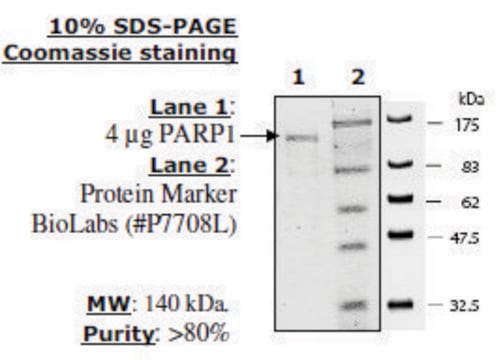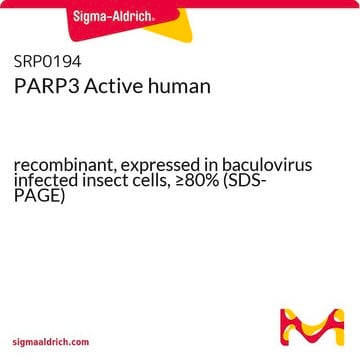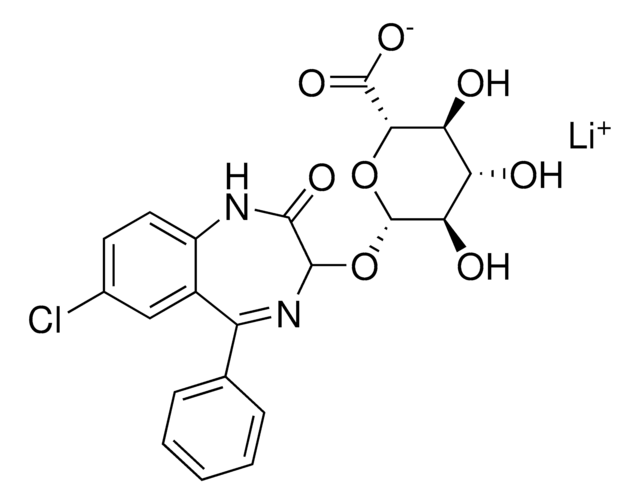P0996
PARP-1 human
recombinant, expressed in E. coli
Sinónimos:
NAD+ ADP-ribosyltransferase, Poly(ADP-ribose) Polymerase
Iniciar sesiónpara Ver la Fijación de precios por contrato y de la organización
About This Item
MDL number:
UNSPSC Code:
12352204
NACRES:
NA.54
Productos recomendados
recombinant
expressed in E. coli
Quality Level
form
solution
UniProt accession no.
shipped in
wet ice
storage temp.
−20°C
Gene Information
human ... PARP1(142)
¿Está buscando productos similares? Visita Guía de comparación de productos
General description
Poly(ADP-ribose) polymerase 1 (PARP-1) is associated with the inflammation response during atherosclerosis.
Poly(ADP-ribose) polymerase 1 (PARP1) belongs to the PARP family which is highly conserved during evolution. PARP1 gene is localized at 1q42.12 in the human chromosome.
Application
PARP-1 human has been used in the GST-pull down assay for immunoprecipitation of Glutathione S-transferase (GST) or GST- cyclic GMP- AMP synthase (cGAS) (GST-cGAS). It has also been used in in vitro ribosylation assay.
PARP-1 is a nuclear enzyme that synthesizes ADP-ribose polymers from NAD+, specifically binds Zn2+ and DNA, and recognizes single-strand breaks in DNA. PARP1 has been used in a study to assess racial and tissue-specific cancer risk associated with polymorphism in the PARP1 gene. It has also been used in a study to investigate inhibitors of PARP-1 for potential cancer treatments.
Biochem/physiol Actions
PARP-1 is inactivated by cleavage into a 24kDA and 89kDA fragment by activated caspase-3 or caspase-7. This results in the decreased ability to repair DNA damage and an increase in apoptosis.
PARP-1, a nuclear enzyme that synthesizes ADP-ribose polymers from NAD, specifically binds Zn2+ and DNA, and recognizes single-strand breaks in DNA. It is involved in base excision repair, both short-patch and long-patch, rejoining DNA strand breaks and plays a role in p53 expression and activation. A high level of basal neuronal DNA damage and PARP activity has been reported in rat brain tissue. PARP-1 was shown to be required for HIV-1 integration into DNA. If PARP-1 is deficient there is no productive HIV-1 infection.
Poly(ADP-ribose) polymerase 1 (PARP1) is essential for diverse functions like DNA damage detection and repair, chromatin modification, cell differentiation, transcription and apoptotic cell death. It also plays a major role in spermatogenesis. Polymorphism in the gene PARP1 is associated with oligospermia and causes male infertility.
Unit Definition
One unit will incorporate 10 femptomole of poly(ADP-ribose) from NAD into 5 μg of immobilized histone proteins in 30 minutes at 22 °C in a 96 well plate.
Physical form
Supplied as a solution in 20 mM Tris-HCl, pH 8.0, 200 mM NaCl, 1 mM DTT, 0.1% Triton™-X 100, 50 % glycerol, and 0.1 mg/ml BSA.
Legal Information
Triton is a trademark of The Dow Chemical Company or an affiliated company of Dow
Storage Class
10 - Combustible liquids
wgk_germany
WGK 2
flash_point_f
Not applicable
flash_point_c
Not applicable
Elija entre una de las versiones más recientes:
¿Ya tiene este producto?
Encuentre la documentación para los productos que ha comprado recientemente en la Biblioteca de documentos.
Nuclear cGAS suppresses DNA repair and promotes tumorigenesis
Liu H, et al.
Nature, 563(7729), 131-131 (2018)
David Davidson et al.
Investigational new drugs, 31(2), 461-468 (2012-10-12)
Poly [ADP-ribose] polymerase-1 (PARP-1) localizes rapidly to sites of DNA damage and has been associated with various repair mechanisms including base excision repair (BER) and homologous recombination/non-homologous end joining (HRR/NHEJ). PARP-1 acts by adding poly-ADP ribose side chains to target
PARP cleavage as a means of assessing apoptosis.
Peter Mullen
Methods in molecular medicine, 88, 171-181 (2003-11-25)
JNK phosphorylates SIRT6 to stimulate DNA double-strand break repair in response to oxidative stress by recruiting PARP1 to DNA breaks
Van Meter M, et al.
Testing, 16(10), 2641-2650 (2016)
S Muller et al.
Clinical immunology and immunopathology, 73(2), 187-196 (1994-11-01)
Poly(ADP-Ribose) polymerase (PARP) is a chromatin-associated enzyme that specifically binds to DNA strand breaks in a zinc-dependent manner. We describe here the presence of IgG antibodies reacting with recombinant human PARP in the serum of patients with systemic lupus erythematosus
Nuestro equipo de científicos tiene experiencia en todas las áreas de investigación: Ciencias de la vida, Ciencia de los materiales, Síntesis química, Cromatografía, Analítica y muchas otras.
Póngase en contacto con el Servicio técnico








